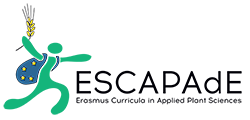English title:
Storage of horticultural products
Course ID:
952144
ECTS credits:
3,0
Title in native language:
Lagerung von gartenbaulichen Produkten
Lagerung von gartenbaulichen Produkten
Term Semester:
Autumn/Winter
Instruction language(s):
German
Course content:
Lecture (60%): Causes of spoilage during storage and their classification. Processes occurring in the raw material after harvest, factors influencing the storability and shelf life of produce: genetic characteristics, environmental conditions, cultivation management, maturity, post-harvest treatments, storage conditions, shelf life and freshness enhancing treatments. Storage technologies of horticultural products, processes, application design, regulatory systems, ventilation, atmospheric composition, advantages and disadvantages of the system, ethylene problems during storage. Loading and hygiene of storage areas, packaging, technology and storage conditions of selected horticultural products (perishable and storable).
Exercises (40%): Evaluation of the suitability of the raw material for storage, verification of storage procedures and conditions for various products after harvest and storage period (colorimetry, mass losses determination, reducing sugars, dry matter, brix, titratable acidity, ascorbic acid and selected antioxidants).
Exercises (40%): Evaluation of the suitability of the raw material for storage, verification of storage procedures and conditions for various products after harvest and storage period (colorimetry, mass losses determination, reducing sugars, dry matter, brix, titratable acidity, ascorbic acid and selected antioxidants).
Expected previous knowledge:
A basic knowledge of crop production is required. The stand-alone work on specific tasks is a prerequisite for completion of the course!
Learning outcomes:
Students will learn the physiological, biochemical, microbiological and chemical processes in horticultural products of various origin, which occur after the harvest, during storage, and transport (such as perspiration, respiration, ripening, stress, aging, senescence, discoloration, wilting, mass loss etc.). They recognize characteristic symptoms on the horticultural products and learn an appropriate range of methods and the conditions that lead to an extension of the shelf life and to preservation of freshness and quality as a function of plant material and the intended purpose. They are aware of the potential causes of spoilage and losses after harvest and during storage and can classify them. They know the factors that influence the postharvest behavior, e.g. the genetic potential, environmental conditions, cultivation methods, maturity, postharvest treatments, storage conditions, and postharvest technology. They handle with storage technologies, their types, regulatory systems, equipment design, indoor climate, loading facilities, mechanization of operations, packaging, sorting species and hygienic requirements. They are able to apply the acquired knowledge in the daily life.
Teaching and learning methods:
Lecture 60% (multimedia presentation)
Exercises 40% (mandatory, laboratory work)
Exercises 40% (mandatory, laboratory work)
Exam method:
continuous assessment, assessment of the final presentation in the plenary in accordance with predetermined criteria, exercises: a practice report according to predefined criteria (participation in the exercises is mandatory (3 Dates)).
Organisation: University of Natural Resources and Life Sciences Vienna
Country:
Austria
Acronym:
BOKU
ERASMUS+ code:
A WIEN03
Teaching period summer semester:
22. Feb 2021 - 30. Sep 2021
Teaching period winter semester:
13. Oct 2020 - 21. Feb 2021
University website:
